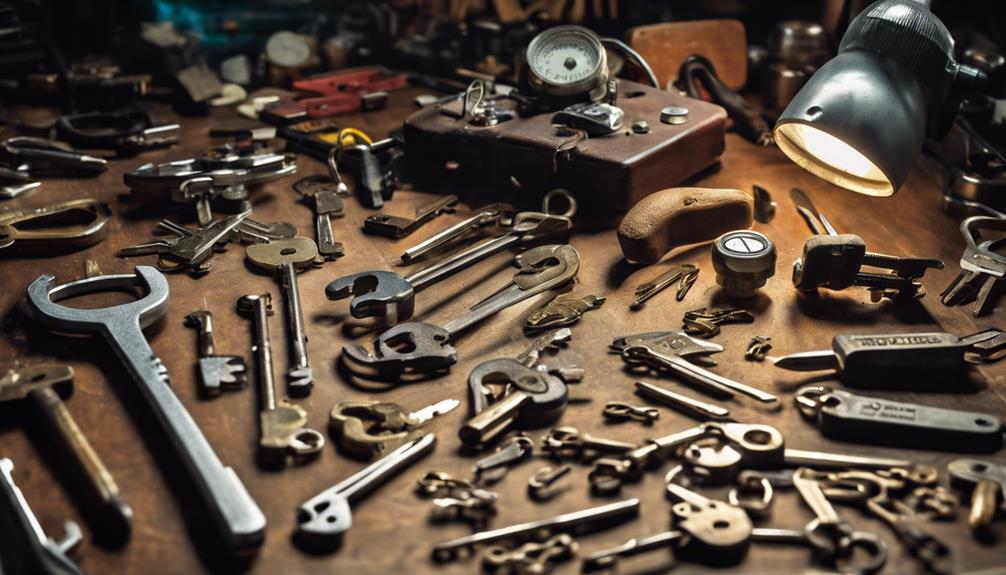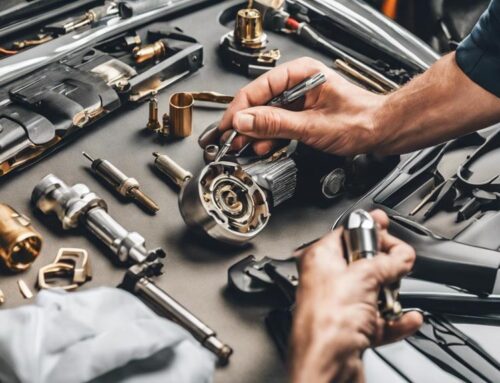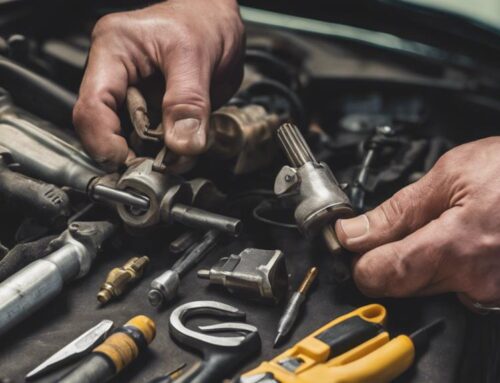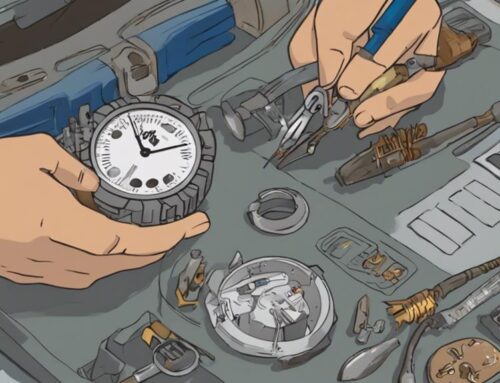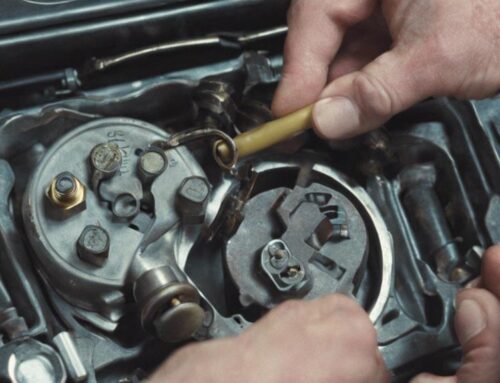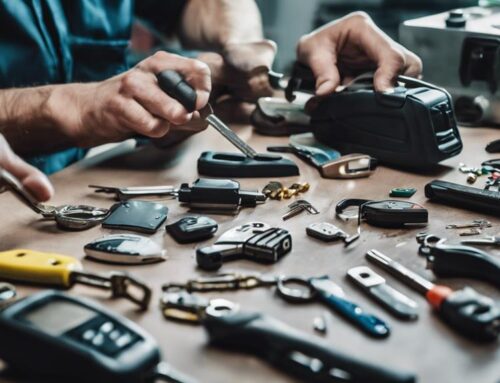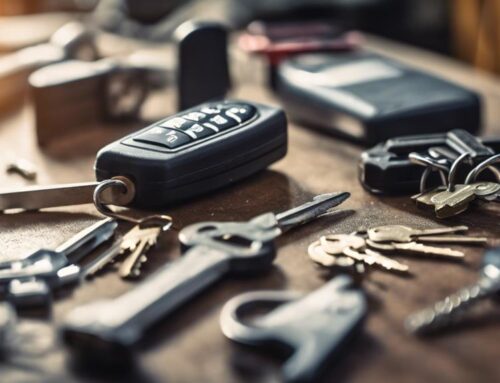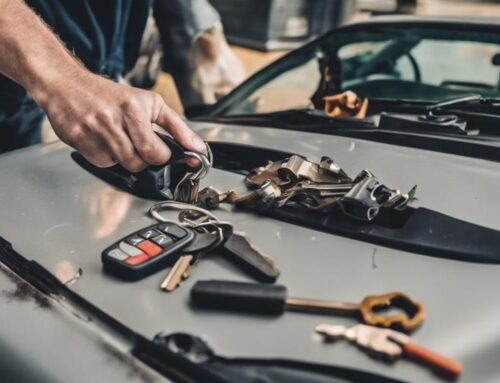Yes, a locksmith can make a copy of a high-security key, but it’s not as straightforward as copying a standard key. High-security keys often feature complex designs and electronic components specifically engineered to prevent unauthorized duplication. To legally duplicate these keys, locksmiths must have proper authorization and comply with specific copyright laws protecting the key’s design. You’ll need to provide proof of ownership and appropriate documentation. Additionally, not all locksmiths have the necessary equipment or expertise to handle high-security key duplication accurately. Make sure you’re working with a reputable locksmith familiar with these specialized keys. There’s more to understand about the intricate process involved.
Understanding High-Security Keys
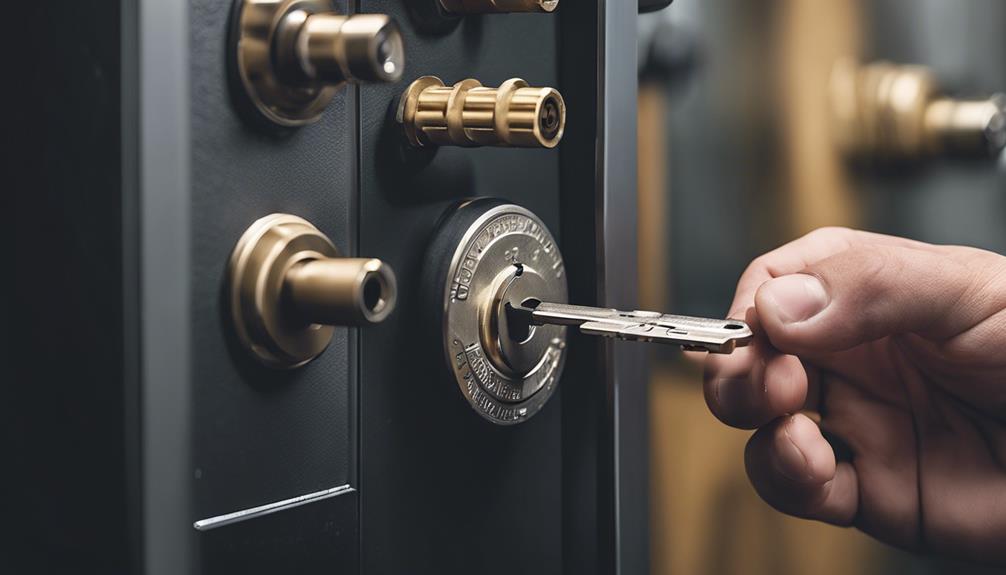
High-security keys, with their complex designs and electronic components, are specifically engineered to thwart duplication. You might think it’s overkill until you remember that one time your sneaky cousin tried to copy your apartment key to crash on your couch. These aren’t your average Home Depot duplicates. High-security keys are the Navy SEALs of the key world; they come equipped with patented features that scream, “Nope, not today, pal!”
Legal Considerations
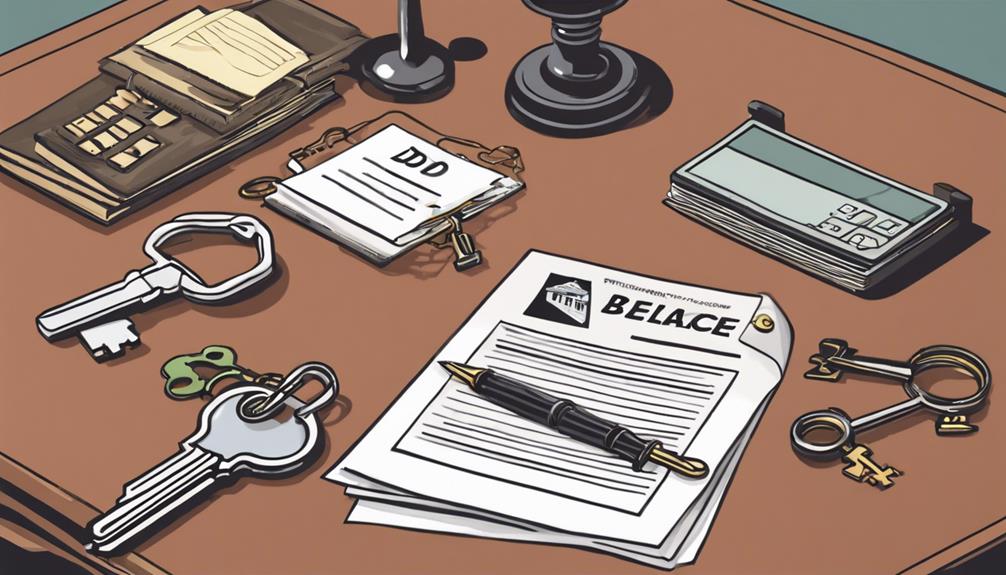
When you’re contemplating obtaining a copy of a high-security key, you need to be aware of the copyright laws that may impact this process. You must verify that the locksmith has the proper authorization to duplicate these keys, as doing so without permission can lead to severe legal penalties. Understanding these legal boundaries is essential to maintaining the integrity of your security system and avoiding any potential liabilities.
Copyright Laws Impact
You should be aware that copyright laws may restrict a locksmith’s ability to duplicate high-security keys. It’s not just about cutting a piece of metal; it’s about not stepping on the toes of some big patent shoes! Some key designs are like the VIP section in a club—exclusive and locked down under patent protection. This makes the key duplication game a bit tricky. Without the right handshake, or in this case, authorization, duplicating these keys could land a locksmith in hot water, legally speaking. So, if you’re looking to duplicate that fancy security key, make sure your locksmith isn’t just good, but also on the right side of the law!
Authorized Duplication Permissions
Understanding the legal framework is crucial before asking a locksmith to duplicate a high-security key. If you’ve got a security key, remember, key cutting isn’t a free-for-all. You’ll need the right permissions, or you’re diving into murky waters. Here’s a quick cheat sheet:
| Requirement | Why Necessary? | Consequence of Ignoring |
|---|---|---|
| Ownership Proof | To verify rightful key ownership | No key for you! |
| Authorization Doc | Required for ‘do not duplicate’ keys | Might face legal issues |
| Reputable Service | Ensures adherence to legal standards | Avoids security breaches |
Potential Legal Penalties
Copying a high-security key marked ‘do not duplicate‘ without authorization can lead to significant legal penalties. If you’re a locksmith, you might think twice before playing the key-copying hero. Duplicating these high-security keys without the green light can land you in hot water, and not the relaxing bubble bath kind. Depending on where you’re at, the legal consequences can be as chilling as an ice bath. Locksmiths could face fines that’ll make their tools tremble, or even harsher penalties that are no laughing matter. Each region has its own set of rules, so it’s essential to stick to the script. Remember, when it comes to high-security keys, it’s better safe than sorry—legally speaking!
Duplication Process
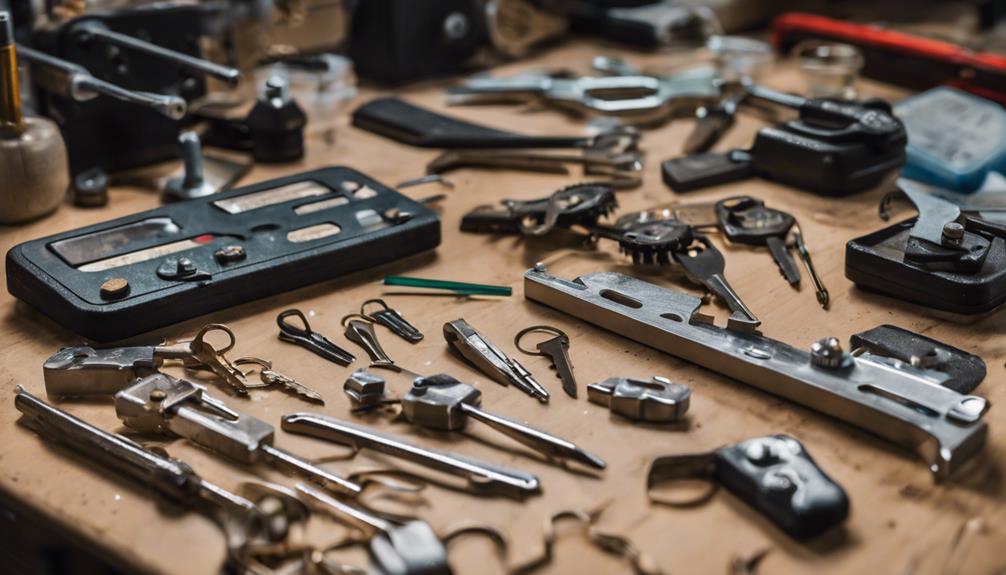
To duplicate a high-security key, locksmiths must first obtain authorization from the key’s owner. It’s not like copying a dodgy old diary key; this is serious business! Once they’ve got the green light, locksmiths enter a world of strict protocols to keep the lock-picking gremlins at bay. They’ll verify who you are—probably short of taking your firstborn but don’t put it past them—and then proceed with the hush-hush task of high-security key duplication. It’s all about maintaining the sanctity of the key control system, ensuring no rogue keys escape into the wild. So, rest assured, your high-security lock is as secure as Fort Knox, even after a trip to your friendly neighborhood locksmith!
Required Equipment
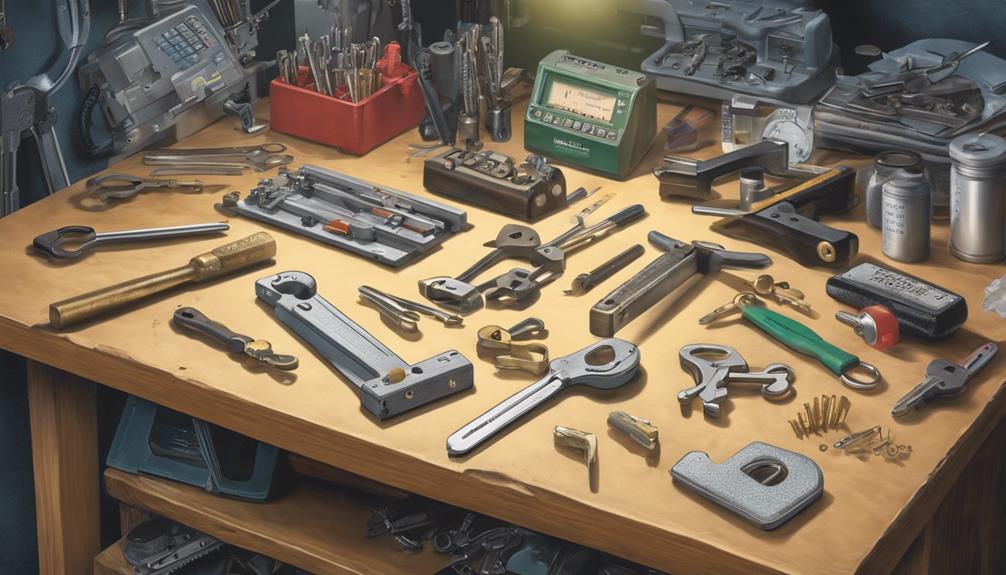
To replicate a high-security key, you’ll need specialized key machines that are capable of handling intricate cuts and patterns. Additionally, locksmiths must use authorization verification tools to make certain they’re legally allowed to make a copy. These tools together help maintain the integrity and security of the original key’s design.
Specialized Key Machines
You’ll need specialized key machines to accurately duplicate high-security keys. These aren’t your average key-cutting gadgets that you find at a hardware store next to the birdseed. Nope, these machines are the elite athletes of the locksmith world, designed to handle the unique, often bizarre shapes and configurations of high-security key blanks. Think of them as the gymnasts of key cutting—flexible, precise, and not messing around with simple tasks.
High-security keys, with their complex cuts and quirky restrictions, often have more personality than your average sitcom character. Using regular old key-cutting machines on these prima donnas? You’d end up with more errors than a bad episode of reality TV. So, stick with the pros and their fancy machinery!
Authorization Verification Tools
Locksmiths must utilize authorization verification tools to guarantee only approved individuals can duplicate high-security keys. Imagine a world where anyone could copy your super-secret spy movie-worthy key—chaos would ensue! Thankfully, locksmiths have their trusty verification tools. These tools are not just fancy gadgets; they’re your gatekeepers against unauthorized key cloning. Envision this: key code databases that know more about your key’s pedigree than you do about your family tree, authorization forms that need more signatures than a peace treaty, and digital verification systems that could probably pass for a lie detector. These tools ensure that only the chosen few can replicate high-security keys, keeping the riff-raff out of your secret lair!
Authorization Protocols
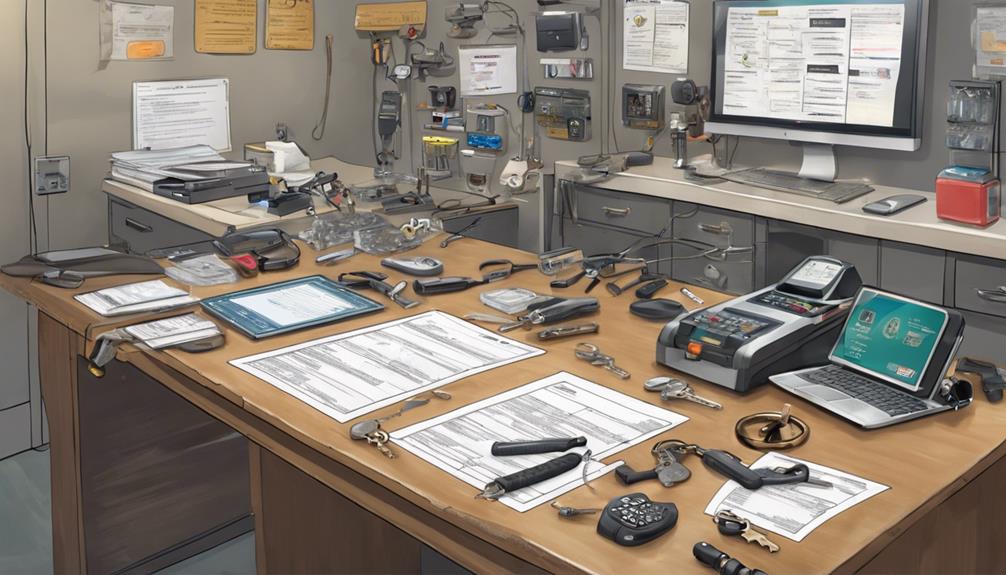
When duplicating high-security keys, locksmiths must follow strict authorization protocols to guarantee each copy is officially sanctioned. Imagine you’re a locksmith in a world where high-security keys are like VIP passes to an exclusive club. You can’t just let anyone clone that golden ticket without the big boss’s nod, right? So, before the duplication process kicks off, you’d need the green light from the key holder or their designated hitter.
This isn’t just about keeping the keys out of the wrong hands; it’s about ensuring that the fort remains unbreachable. Without these protocols, it’d be like giving out copies of your diary key—definitely a no-go! So, next time you’re puzzled why your locksmith is grilling you for details, remember, they’re just sticking to the script!
Ethical Concerns
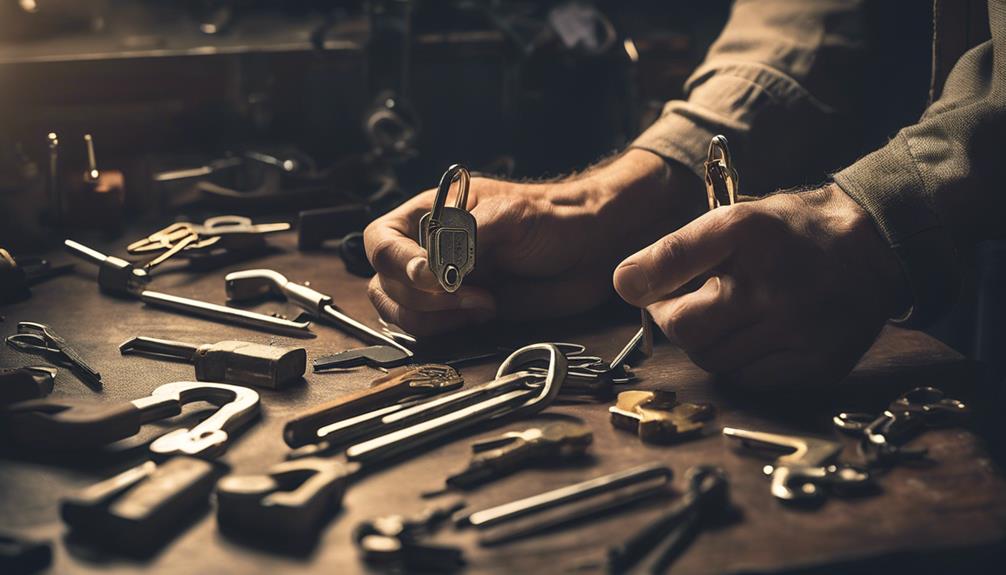
While adhering to authorization protocols is necessary, it’s equally important to contemplate the ethical implications of duplicating high-security keys. You see, when locksmiths casually pop out a copy of your Fort Knox-esque key, they might just be opening a can of worms rather than your back door. Unauthorized duplications? Oh, they’re as welcome as a skunk at a lawn party, seriously undermining the whole “high-security” spiel. Ethical concerns pop up like whack-a-moles—locksmiths must navigate these choppy waters with the grace of a ballet dancer wearing oversized flippers. It’s all about not turning those shiny, intricate keys into tools for potential mischief. So, remember, a key copied without ethics is just a shortcut to chaos!
Verification Steps
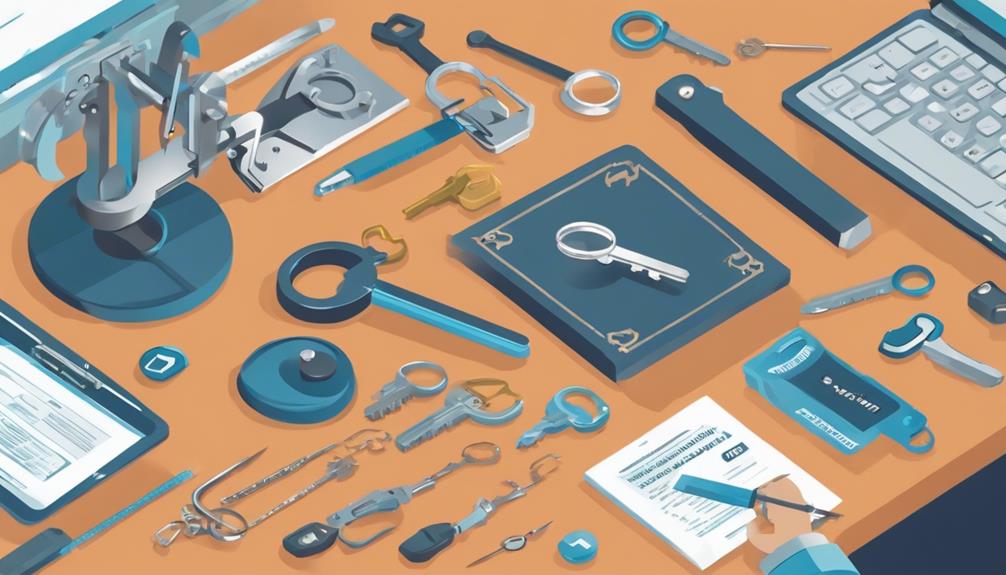
To guarantee the security of high-security key duplication, you must first verify ownership and authorization. This isn’t just about making sure that no random Joe can waltz in and get a copy of your ultra-secure keys; it’s about keeping the baddies at bay! High-security keys are designed to give you peace of mind, and locksmiths must confirm this isn’t compromised. So, when you strut into a locksmith’s shop asking for a duplicate, don’t be surprised if they ask for your ID or documentation proving you’re the big boss of your keychain. It’s all part of the security due process. After all, these keys require specialized care, and not just any Tom, Dick, or Harry with a key cutter can handle them!
Expertise Needed
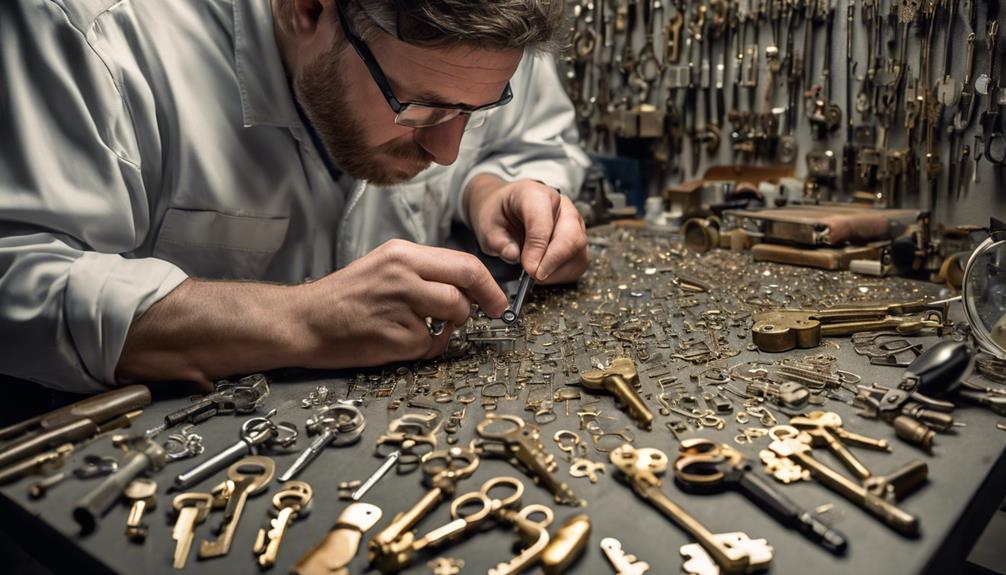
You’ll need a locksmith with specialized expertise to duplicate your high-security key accurately. Not all locksmiths are created equal, especially when it comes to the intricate dance of duplicating high-security keys. These are not your average key copies; they’re like the VIPs of the key world, requiring red carpet equipment and a locksmith with a very particular set of skills. Precision and a keen eye for detail are must-haves because even the tiniest misstep can turn your key copy into a dud. So, when you’re entrusting someone to replicate your high-security marvel, make sure they’re not just any locksmith but one thoroughly versed in the high-stakes world of high-security key duplication.
Promoting Low Rate Locksmith
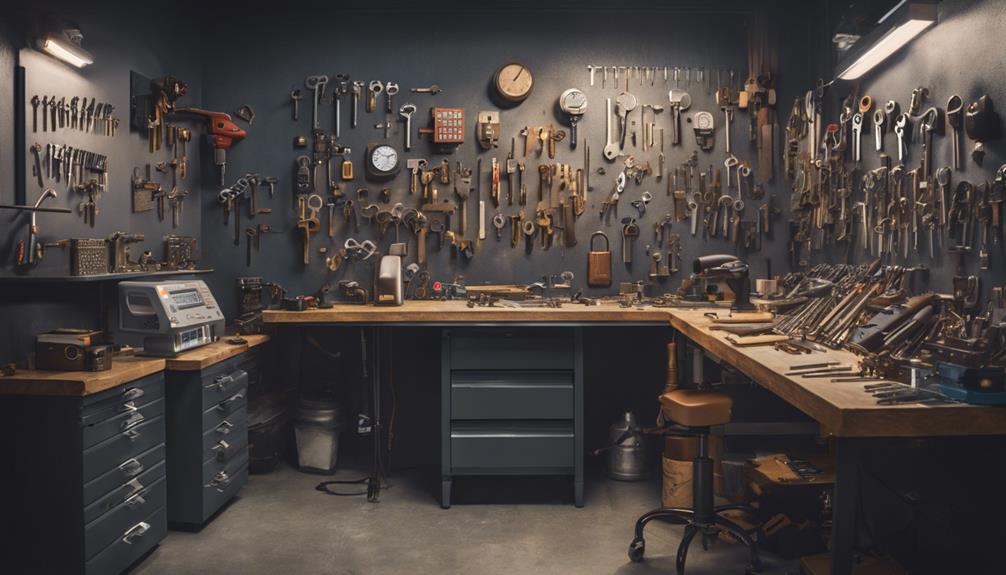
If you’re looking for a locksmith capable of precisely duplicating high-security keys, consider Low Rate Locksmith, renowned for their expertise and affordability. Now, let’s face it, when it comes to the world of lock and key, not all heroes wear capes—some just carry a bunch of keys and know a heck of a lot about locks! Low Rate Locksmith isn’t just any key cutter; they specialize in the art of high-security key duplication. Whether your keys have more ridges than a mountain range or include fancy electronic components, these guys handle it all. Reliable, efficient, and won’t cost you an arm and a leg—what more could you ask for in a locksmith?
Frequently Asked Questions
How Long Does It Take to Copy a High-Security Key?
Ever wondered how long it takes to copy a high-security key? Well, it usually ranges from a few minutes to a few hours. This timing depends on the key’s complexity and the locksmith’s equipment. You’ll also need proof you own the key—no one wants to enable a heist, right? Booking an appointment can speed things up, so you’re not stuck waiting. Always check if your locksmith has the right tools and know-how!
Can High-Security Keys Be Tracked or Traced?
Yes, high-security keys can be tracked and traced. Each key has a unique code that locksmiths use to verify ownership before making a copy. This tracking system helps maintain key control and prevents unauthorized copies. So, if you’re worried about someone copying your fancy key without permission, rest easy knowing there’s a system in place to keep your locks secure. Just make sure you keep that code somewhere safe!
Are Copied High-Security Keys as Durable as the Original?
You might wonder if copied high-security keys hold up as well as the originals. The answer is yes, they do. Thanks to the precision cutting and robust materials used, these duplicates are just as tough and reliable. Locksmiths guarantee that each copy is a spitting image of the original, maintaining the same level of security and durability. So, no need to worry; your copied key is as good as gold!
Do Weather Conditions Affect High-Security Key Duplication?
No, weather conditions don’t affect high-security key duplication. Locksmiths perform this precision task in controlled environments, using specialized tools that aren’t impacted by the weather outside. So, whether it’s raining cats and dogs or scorching hot, it won’t interfere with your key copying process. Just make sure you’re dealing with a skilled locksmith who has the right equipment, and you’ll get a perfect copy, come rain or shine.
Can Old High-Security Keys Still Be Duplicated Effectively?
Yes, you can still get old high-security keys duplicated, but it’s not always a walk in the park. You’ll need to find a locksmith with the right know-how and gear, as these keys often require more than your average key-cutting equipment. Some older systems might also have restrictions on who can make copies, so check that out first. Always best to consult a pro to see if it’s doable!

